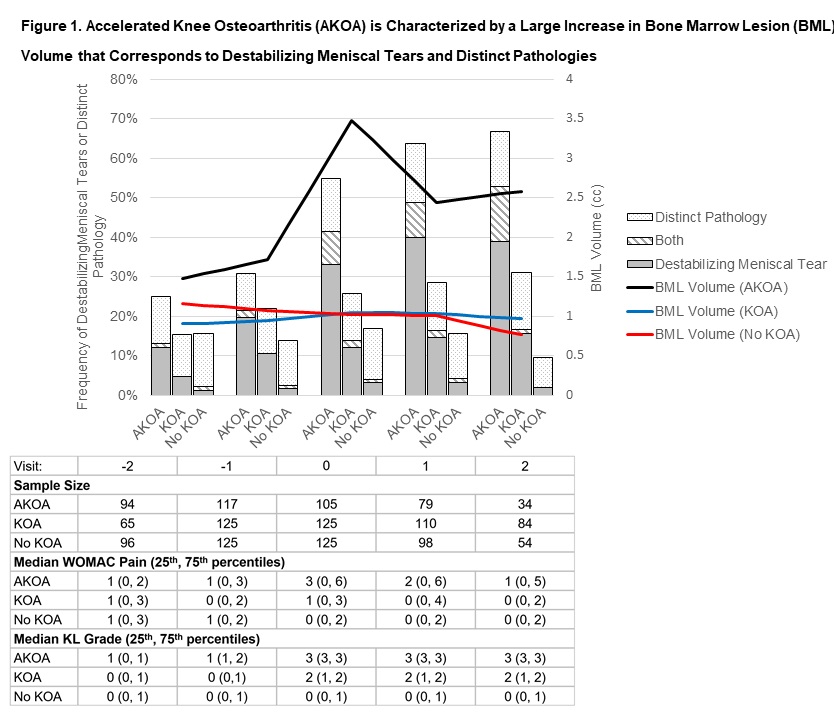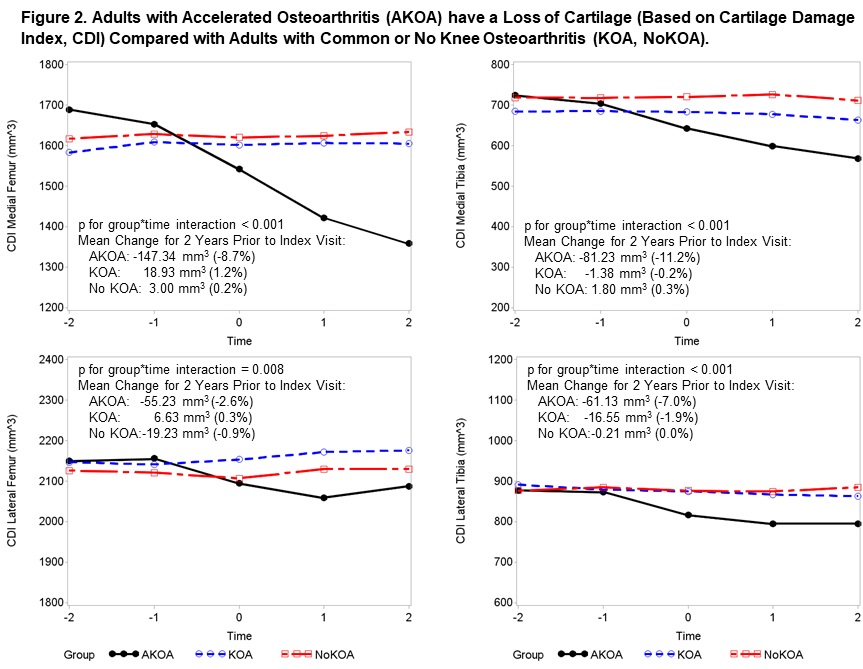Session Information
Session Type: ACR Poster Session A
Session Time: 9:00AM-11:00AM
Background/Purpose: A subset of adults who develop knee osteoarthritis (KOA) quickly progress from no radiographic disease to advanced-stage disease often in ≤12 months. Adults with accelerated KOA (AKOA) have greater pain and disability than those with common KOA even prior to radiographic onset. AKOA may be a unique endotype of KOA consequent on specific pathologies, as opposed to rapid evolution of common KOA; however, this hypothesis is untested. Hence, we aimed to determine if incident AKOA is preceded and characterized by distinct pathologic changes (e.g., subchondral bone damage), destabilizing meniscal tears (e.g., root/anchor tears) or other secondary feature changes; such as, diffuse meniscal pathology, greater quantitative changes in bone marrow lesions (BMLs) and articular cartilage than adults with common or no KOA.
Methods: We selected 3 sex-matched groups from the Osteoarthritis Initiative who had a knee without radiographic KOA at baseline (Kellgren-Lawrence [KL]<2): AKOA developed KL grade≥3 ≤48 months, common KOA increased radiographic scoring ≤48 months without meeting AKOA criteria, and no KOA had the same KL grades at baseline and 48 months. Observation period was up to 2 years before and after an index visit, which was when the AKOA or common KOA criteria were met (no KOA index visit was matched to AKOA). Radiologists reported meniscal and other distinct pathological findings. We quantified BML volume and cartilage damage on magnetic resonance (MR) images. We performed linear mixed models – adjusting for sex and factors related to missing MR data.
Results: Overall the groups were predominantly female (63%), overweight, and 33% reported frequent knee pain within a year of baseline. At 1 year before the index visit, >75% of adults with AKOA had multiple meniscal regions affected (diffuse pathology; vs common KOA: OR=3.19, 95% CI=1.70 to 5.97). By the index visit, adults with AKOA were twice as likely to have distinct pathology than those with common KOA (OR=2.19, 95% CI=1.01, 4.77; Figure 1). The most common distinct pathology affected the subchondral bone (i.e., subchondral fracture, acute attrition), which was found in 12.3% of adults with AKOA, 0.8% with common KOA, and 1.6% with no KOA. Diffuse meniscal pathology was ubiquitous in AKOA; including 42% with a destabilizing meniscal tear (common KOA: 14%). These changes corresponded to larger BMLs and greater cartilage loss (Figure 1 and 2).
Conclusion: AKOA is characterized by destabilizing meniscal tears in a knee with greater pre-radiographic disease (e.g., diffuse meniscal pathology, large BMLs, greater cartilage loss)


To cite this abstract in AMA style:
Driban JB, Davis J, Lu B, Price LL, Ward RJ, MacKay J, Eaton CB, Lo GH, Barbe M, Zhang M, Pang J, Stout A, Harkey M, McAlindon TE. Accelerated Knee Osteoarthritis Is Characterized By Destabilizing Meniscal Tears and Pre-Radiographic Structural Disease Burden [abstract]. Arthritis Rheumatol. 2018; 70 (suppl 9). https://acrabstracts.org/abstract/accelerated-knee-osteoarthritis-is-characterized-by-destabilizing-meniscal-tears-and-pre-radiographic-structural-disease-burden/. Accessed .« Back to 2018 ACR/ARHP Annual Meeting
ACR Meeting Abstracts - https://acrabstracts.org/abstract/accelerated-knee-osteoarthritis-is-characterized-by-destabilizing-meniscal-tears-and-pre-radiographic-structural-disease-burden/
